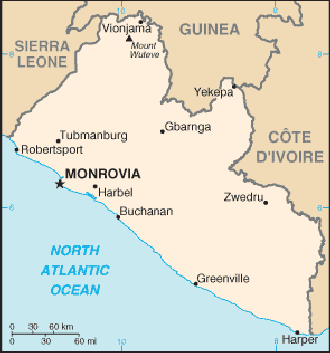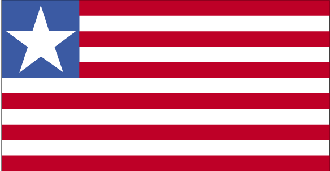
|
Liberia
Background:
Eight years of civil strife were brought to a close in 1997 when free and open
presidential and legislative elections were held. President Taylor now holds
strong executive power with no real political opposition. Years of fighting,
coupled with the flight of most businesses, have disrupted formal economic
activity. A still unsettled domestic security situation has slowed the process
of rebuilding the social and economic structure of this war-torn country. In
2001, the UN imposed sanctions on Liberian diamonds, along with an arms embargo
and a travel ban on government officials, for Liberia's support of the rebel
insurgency in Sierra Leone. Renewed rebel activity has further eroded stability
and economic activity. A regional peace initiative commenced in the spring of
2003 but was disrupted by the Special Court for Sierra Leone (SCSL) indictment
of President Taylor on war crimes charges.
Location:
Location: Western Africa, bordering the North Atlantic Ocean, between Cote
d'Ivoire and Sierra Leone.
Area: Total: 111,370 sq km, water: 15,050 sq km, land: 96,320 sq km.
Area - comparative: Slightly larger than Tennessee.
Land boundaries: Total: 1,585 km, border countries: Guinea 563 km, Cote
d'Ivoire 716 km, Sierra Leone 306 km.
Coastline: 579 km.
Climate and Terrain:
Climate: Tropical; hot, humid; dry winters with hot days and cool to cold
nights; wet, cloudy summers with frequent heavy showers.
Terrain: Mostly flat to rolling coastal plains rising to rolling plateau and
low mountains in northeast.
Natural resources: Iron ore, timber, diamonds, gold, hydropower.
People:
Population: 3,317,176.
Ethnic groups: Indigenous African tribes 95% (including Kpelle, Bassa, Gio,
Kru, Grebo, Mano, Krahn, Gola, Gbandi, Loma, Kissi, Vai, Dei, Bella, Mandingo,
and Mende), Americo-Liberians 2.5% .
Religions: Indigenous beliefs 40%, Christian 40%, Muslim 20%.
Languages: English 20% (official), some 20 ethnic group languages, of which a
few can be written and are used in correspondence.
Government:
Economy overview:
Civil war and misgovernment have destroyed much of Liberia's economy,
especially the infrastructure in and around Monrovia. Many businessmen have
fled the country, taking capital and expertise with them. Some have returned;
many will not. Richly endowed with water, mineral resources, forests, and a
climate favorable to agriculture, Liberia had been a producer and exporter of
basic products - primarily raw timber and rubber. Local manufacturing, mainly
foreign owned, had been small in scope. The restoration of the infrastructure
and the raising of incomes in this ravaged economy depend on the settlement of
civil warfare, the implementation of sound macro- and micro-economic policies,
including the encouragement of foreign investment, and generous support from
donor countries.
Statistics:
Telephones - main lines in use: 6,700.
Telephones - mobile cellular: 0.
Radio broadcast stations: AM 0, FM 7, shortwave 2.
Radios: 790,000.
Television broadcast stations: 1 (plus four low-power repeaters).
Televisions: 70,000.
Internet users: 500.
Railways: Total: 490 km.
Highways: Total: 10,600 km, paved: 657 km. unpaved: 9,943 km.
Airports - with paved runways: 2, with unpaved runways: 45.
Return to Visiting Locations
|

